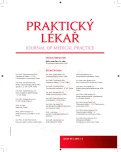Sexual dysfunctions following sphincter-preserving rectal resection
Authors:
J. Kotoč 1; J. Gatěk 1
; K. Kotočová 1; B. Dudešek 1; A. Vrzgula 2; R. Krajničák 2; P. Ponížil
Authors‘ workplace:
Nemocnice Atlas, a. s., Zlín
Chirurgické oddělení
Primář: MUDr. Jiří Gatěk, PhD.
1; Nemocnica Košice-Šaca, a. s., 1. súkromná nemocnica, Košice-Šaca
Chirurgická klinika LF UPJŠ
Prednosta: MUDr. Andrej Vrzgula, PhD.
2; Univerzita T. Bati ve Zlíně, Technologická fakulta
Ústav fyziky a materiálového inženýrství
Ředitel: doc. Mgr. Aleš Mráček, PhD.
3
Published in:
Prakt. Lék. 2015; 95(3): 106-109
Category:
Of different specialties
Overview
Increase in number of sphincter-preserving rectal resections for carcinoma, as well as improved patient survival brings to the fore the question relating to quality of patient's life also in the sense of influencing their sexual functions. These functions may be reduced (temporary or permanently) as a consequence of surgery, radiotherapy or mental suffering of patients with malignant disease.
Using standardized questionnaires, in this prospective study of 42 patients with rectal cancer, pre-operative and post-operative sexual functions of men (International Index of Erectile Function; IIEF) and women (modified Female Sexual Function Index; FSFI) were compared.
Impact of the conventional (open) versus laparoscopic surgical approach on the deterioration of sexual functions, as well as risk factors in relation to the tumour, and risk demographic characteristics of patients were assessed.
In total, 28 of 42 patients (67.7%) were sexually active preoperatively. In the group of 20 men, a worsening of sexual functions occurred in 15 patients (75.0%). This deterioration of sexual functions in men was statistically significant (P = 0.01). In the group of 8 women, a worsening occurred in 4 patients (50.0%), but it was not statistically significant. As risk factor the perioperative blood loss in women was identified (P = 0.1). The influences of the age, BMI, tumour size and distance, and duration of surgery were not found out. Impact of the open or laparoscopic approach on sexual dysfunctions was not proven.
Keywords:
sexual dysfunction – sphincter-preserving rectal resection – IIEF – FSFI – laparoscopic approach – open surgery approach
Sources
1. Bosch SL, Nagtegaal ID. The importance of the patologist‘s role in assessment of the quality of the mesorectum. Curr Colorectal Cancer Rep 2012; 8(2): 90–98.
2. Asoglu O, Matlim T, Karanlik H, et al. Impact of laparoscopic surgery on bladder and sexual function after total mesorectal excision for rectal cancer. Surg Endosc 2009; 23(2): 296–303.
3. Traa MJ, de Vries J, Roukema JA, den Oudsten BL. Sexual (dys)function and the quality of sexual life in patients whith colorectal cancer: a systematic review. Ann Oncol 2012; 23(1): 19–27.
4. Quah HM, Jayne DG, Eu KW, Seow-Choen F. Bladder and sexual dysfunction following laparoscopically assisted and conventional open meserectal resection for cancer. Br J Surg 2002; 89(12): 1551–1556.
5. Daniels IR, Woodward S, Taylor FGM, et al. Female urogenital dysfunction following total mesorectal excision for rectal cancer. World J Surg Oncol 2006; 4 : 6.
6. Morino M, Parini U, Allaix ME, et al. Male sexual and urinary function after laparoscopic total mesorectal excision. Surg Endosc 2009; 23(6): 1233–1240.
7. Doeksen A, Gooszen JAH, van Duijvendijk P, et al. Sexual and urinary functioning after rectal surgery: a prospective comparative study with a median follow-up of 8.5 years. Int J Colorectal Dis 2011; 26(12): 1549–1557.
8. Lange MM, Marijnen CAM, Maas CP, et al. Risk factors for sexual dysfunction after rectal cancer treatment. Eur J Cancer 2009; 45(9): 1578–1588.
9. Celentano V, Fabbrocile G, Luglio G, et al. Prospective study of sexual dysfunction in men with rectal cancer: feasibility and results of nerve sparing surgery. Int J Colorectal Dis 2010; 25 : 1441–1445.
10. Stamopoulos P, Theodoropoulos GE, Papailiou J, et al. Prospective evaluation of sexual function after open and laparoscopic surgery for rectal cancer. Surg Endosc 2009; 23(12): 2665–2674.
11. Nishizawa Y, Ito M, Saito N, et al. Male sexual dysfunction after rectal cancer surgery. Int J Colorectal Dis 2011; 26(12): 1541–1548.
12. Sartori CA, Sartori A, Vigna S, et al. Urinary and sexual disorders after laparoscopic TME for rectal cancer in males. J Gastrointest Surg 2011; 15(4): 637–643.
13. Hendren SK, O’Connor BI, Liu M, et al. Prevalence of male and female sexual dysfunction is high following surgery for rectal cancer. Ann Surg 2005; 242(2): 212–223.
Labels
General practitioner for children and adolescents General practitioner for adultsArticle was published in
General Practitioner

2015 Issue 3
- Advances in the Treatment of Myasthenia Gravis on the Horizon
- Hope Awakens with Early Diagnosis of Parkinson's Disease Based on Skin Odor
- Memantine in Dementia Therapy – Current Findings and Possible Future Applications
- Memantine Eases Daily Life for Patients and Caregivers
- Possibilities of Using Metamizole in the Treatment of Acute Primary Headaches
-
All articles in this issue
- Occupational diseases reported in the Czech Republic in 2014
- Health services research as scientific discipline in the Czech Republic and Slovakia
- Comparison of risks from smoking cigarettes and water pipe
- Reliability of clinical indicators of neonatal sepsis
- Aortic dissection in routine practice
- Sexual dysfunctions following sphincter-preserving rectal resection
- Microbiome, respiratory allergy, and a perspective of treatment
- General Practitioner
- Journal archive
- Current issue
- About the journal
Most read in this issue
- Comparison of risks from smoking cigarettes and water pipe
- Aortic dissection in routine practice
- Reliability of clinical indicators of neonatal sepsis
- Microbiome, respiratory allergy, and a perspective of treatment
